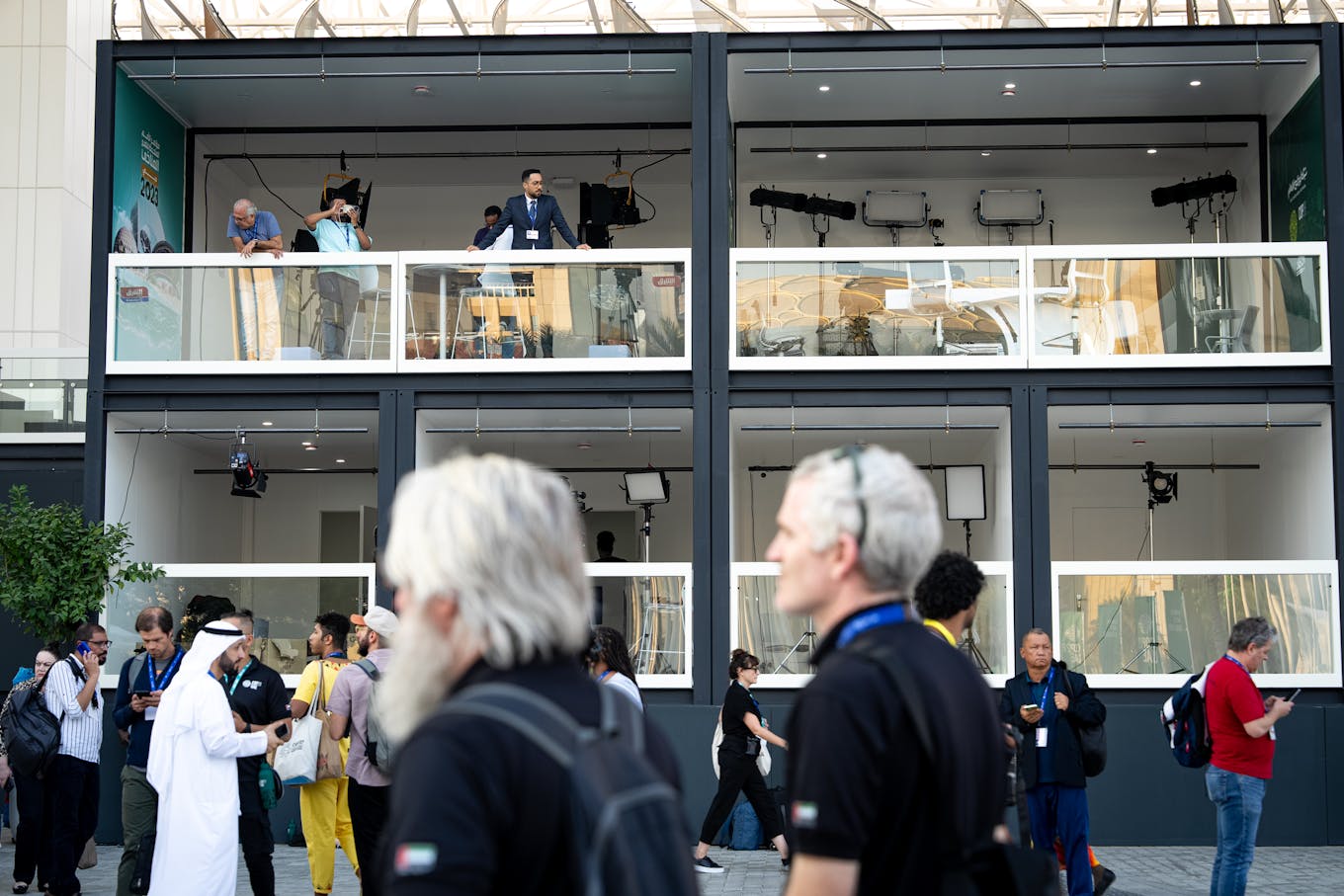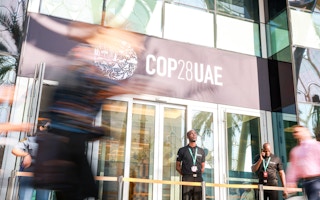A mammoth task awaits environment ministers across the world who are arriving at Expo City Dubai to hammer out a COP28 deal in the next five days: they will need to find ways to help developing countries protect themselves against growing climate risks after days of frustrating impasse.
To continue reading, subscribe to Eco‑Business.
There's something for everyone. We offer a range of subscription plans.
- Access our stories and receive our Insights Weekly newsletter with the free EB Member plan.
- Unlock unlimited access to our content and archive with EB Circle.
- Publish your content with EB Premium.
The politicians will be reading a half-baked draft aimed at shaping a new framework for a “global goal on adaptation”, which now contains only broad and vague aspirations on topics such as food, water and reducing poverty. There has been no consensus yet on text that should detail required finance commitments. Instead, options are listed: if parties should reiterate a general call to send developing countries more money, settle on a fixed target of at least US$400 billion a year by 2030, or simply “no text”.
Technical staffers, who have already slogged for days on the negotiations, would also have informed them that the draft does not yet fully reflect everyone’s views.
The work on climate adaptation stems from the landmark 2015 Paris Agreement climate deal and has emerged as one of the biggest sticking points at COP28. This is even as the latest two-year work plan calls for a deal to be struck this year. Developing countries now fear that they will have to contend with increasingly severe climate-induced floods, droughts and storms with little external assistance.
“The adaptation file across the board at this COP has been dire, dismal, awful,” said conference tracker Dr Jennifer Allan of the think tank International Institute for Sustainable Development (IISD).
Climate adaptation, or finding ways to make communities more resilient to the hazards posed by a warming world, differs from loss and damage, which is focused on recovery efforts after people suffer from extreme weather events. The latter had an early breakthrough at COP28 with an agreement on a new funding scheme.
Early setbacks
Signs of trouble for work on the adaptation document emerged as early as Monday, when facilitators from Belize and Sweden released a draft agreement, saying they had had to work overnight to find common ground. Negotiators said the text was imbalanced, unacceptable, unworkable, and asked the facilitators to start over, according to conference summaries by IISD observers.
A Tuesday draft added more details but again failed to rally consensus. National policymakers are working off this draft starting today.
Observers say talks have been stalled by differing expectations of how much detail the adaptation framework arising from COP28 should contain, such that there was no time to discuss substantial matters.
A group of the world’s 46 least developed countries had said before COP28 that there should be detailed themes and indicators to measure progress on climate adaptation. Instead, the latest draft text will push such work to start early next year.
In the meantime, generic targets call for “achieving climate-resilient food and agriculture systems”, and “increasing the reliance of infrastructure and human settlements”. Quantifiers are in place for some goals, such as “universal” access to drinking water, and protecting 30 per cent of ecosystems – a global target set at the end of 2022.
Such work is inherently complicated. While there is a clear understanding of what fighting climate change means – reducing carbon emissions – there is no fixed measure of adequately protecting people against the impacts of global warming.
On adaptation finance, disagreements remain on whether there should be a push for more debt-free grants, and if the global community should acknowledge that even a doubling of funding from 2019 to 2025 would be insufficient given the scale of climate risks today.
A United Nations report last month had said that developing countries need 10 to 18 times more adaptation finance than what is currently flowing internationally, and that US$387 billion is needed a year.
Cross-cutting issues
A failure to agree on the global goal on adaptation will have “knock-on effects” in other COP28 workstreams too. IISD’s Allan pointed to another declaration being worked on to scale up climate ambition in response to a global stocktake of current measures, which will have to reference the adaptation goals.
“There is a lot to play for here. Hopefully [work on the adaptation goals] can ramp up because it is a huge priority moving forward, when we are already at 1.2°C [of warming],” Allan said.
“We cannot have climate mitigation on one side, and loss and damage on the other, and completely forget the middle of the spectrum, on adaptation,” she added.
“
We are in danger of allowing the narrative on loss and damage to crowd out the importance [of] adaptation.
Mia Mottley, Barbados prime minister
However, some also suspect that adaptation money is being diverted towards loss and damage, into which countries have pledged over US$700 million. Meanwhile, a UN multilateral adaptation fund is struggling – while US$356 million was mobilised at COP26 in 2021, less than US$166 million has been committed thus far at COP28.
“We are in danger of allowing the narrative on loss and damage to crowd out the importance [of] adaptation,” Mia Mottley, prime minister of Caribbean nation Barbados, said on Monday.
“What we want is to avert damage and avert losses before the [extreme climate] event, which is why adaptation funding is critical,” she added.
The COP28 leadership has indicated it understands the challenges. On Wednesday, before a one-day recess, summit president Sultan Al Jaber told delegates he will work with ministers from around the world to deliver a “robust outcome” for the global goal on adaptation.
“An outcome under the global goal on adaptation is essential to creating a pathway that makes a difference in protecting people, livelihoods and ecosystems,” Al Jaber said.
“I call on Parties to also consider how we can make real progress to address the adaptation finance gap. All these issues require more work – some need more time for further technical discussion, while some require engagement of heads of delegation or ministerial guidance,” he added.

Delegates and COP28 participants at Expo City Dubai on the evening of Wednesday, 6 December 2023. Thursday was the only official rest day for the summit. Image: Eco-Business/ Jessica Cheam.
Pratishtha Singh, senior international policy analyst at Climate Action Network Canada, said developed countries have to step up.
“Developed nations particularly need to do their part and lead talks, while respecting the principles of equity, historical responsibility and climate justice,” she said.
Countdown starts
COP28’s Al-Jaber has said he intends to end the summit on time, on Tuesday, “by 11am at the latest”. This would buck a trend of COP summits running overtime – last year’s COP27 had ended on Sunday morning, instead of an intended Friday evening.
Such a plan would require countries to also agree in time on language for fossil fuels: whether there should be a complete “phase-out”, or remove just those not paired with carbon capture, or only ditch coal. Countries remain sharply divided over the options, though they appear to at least have agreed on not using the weaker term “phase down”, which was introduced in 2021.
There is also still a debate on whether a pledge to triple renewable energy capacity globally by 2030, and double the rate of energy efficiency improvement, should make it into a COP28 decision text. The number of countries backing the initiative remains at 123, out of nearly 200 countries.
Al-Jaber added that he will also be looking at unfinished business in areas such as carbon markets.
“With six days of talks down and little to show for it, the gaze turns to the UAE presidency who will take the reins from here,” said a statement by UK-based think-tank E3G at the end of the first half of COP28, on Wednesday.
“How they’ll handle it is anyone’s guess. Let’s hope that in their back pocket they have got a plan to carry the COP package over the finish line,” the statement said.





















